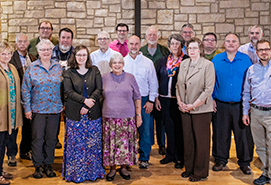Vol 54 No 3 (Summer 2009) presents four articles to stimulate thought around alternatives the Brethren movement offers to twenty-first century religious culture. An article by George Pickens finds an affinity between the Brethren in the Global north and Christians in the Global south, neither of whom have relied on Constantinian understandings of the church in the world. Christina Bucher’s message to the Bethany Seminary graduating class of 2009 names God as an “alluring” God, a God who attracts us rather than coerces us. Scott Holland’s article characterizes the Brethren as people who have bridged particularism and universalism in several ways, especially by noncreedalism, no force in religion, and service for peace and justice. An article based on a paper presented at the BTS Presidential Forum 2009 by John Paul Lederach and Angela Jill Lederach, a father-daughter writing team, offers thoughts on using poetry or poetics for peacemaking.
The Poetics of Building Peace
by John Paul and Angela Jill Lederach
Open by reading aloud the Beatitudes (Matt. 5:1-12). How are making peace and making art alike? What are the objectives of each? What is the process of each?
For further study: more questions for reflection (pdf)*
The Allure of God and the Lure of Love
by Christina Bucher
Bucher says, “The allure of God is the power of God to attract, not to coerce.” In what way does God attract you? Is there any way in which God uses coercion or threats to get people to believe and follow? If so, what are the threats?
For further study: more questions for reflection (pdf)*
The Southern Shift in World Christianity: A Kairos Episode for Brethren
by George Pickens
George Pickens shows that the church in the northern hemisphere is now smaller than the church in the southern hemisphere. What are the growth trends in your congregation over the last 50 years? To what do you attribute the changes?
For further study: more questions for reflection (pdf)*
Three Hundred Years of Pietism, Anabaptism and Pluralism
by Scott Holland
Holland points out that the Brethren focus as much on Jesus’ life as his death and resurrection, and as much on Jesus’ work in this world as in the next. What difference do these emphases make in how we understand the mission of Jesus?
For further study: more questions for reflection (pdf)*








 Green Circle: Bethany invests in 100% renewable energy.
Green Circle: Bethany invests in 100% renewable energy.